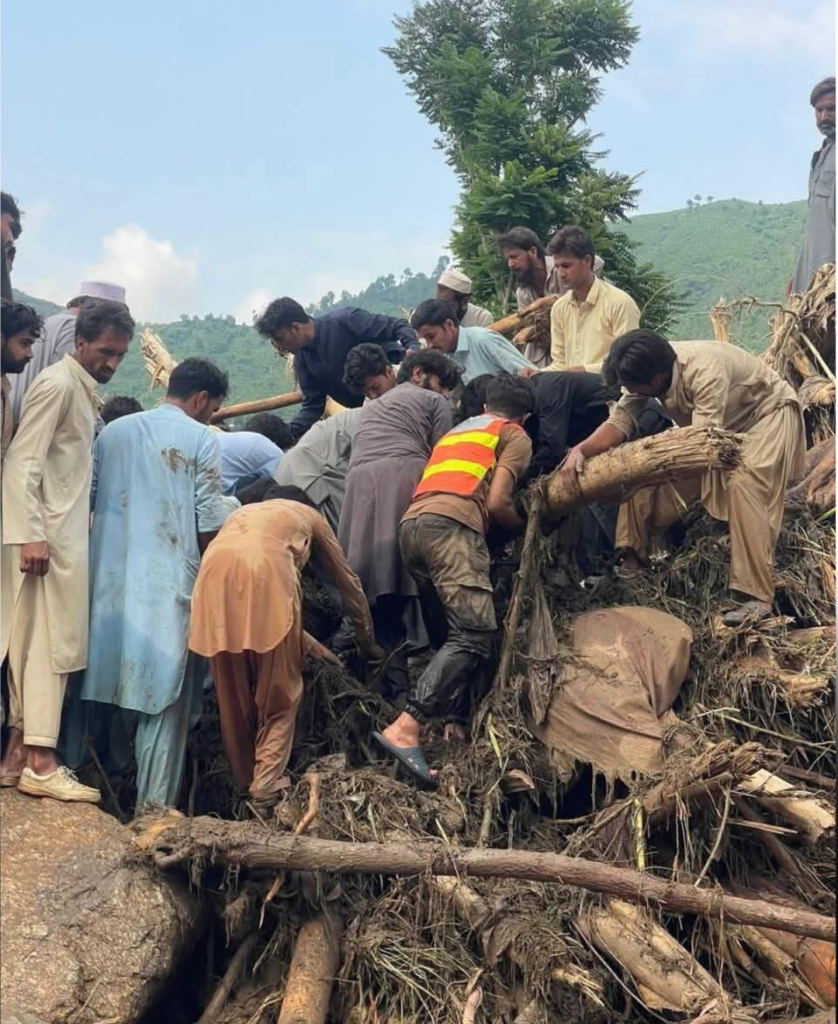
Historically, the concept of national security in Pakistan – like much of the world – has been rooted in military strength and border defence. However, the 21st century has fundamentally reshaped this paradigm. The threats nations face today increasingly stem from non-traditional sources, and climate change stands out as a foremost concern. For Pakistan, these threats are not hypothetical. They are real, immediate, and catastrophic.
Once again, the catastrophic impact of climate change has made itself tragically visible in Pakistan. In the last 30-36 hours, flash floods triggered by torrential monsoon rains have wreaked havoc in parts of Khyber Pakhtunkhwa, particularly in the districts of Buner, Bajaur, Dir, Swat, and Shangla. Among these, Buner district has witnessed the most horrifying devastation, with initial reports suggesting the loss of nearly 350 lives, alongside numerous injuries and missing persons buried under debris. Rescue operations are ongoing, but authorities fear the death toll could rise.
In Bajaur, a remote village bore the brunt of the flooding, where 21 lives were lost and at least 9 people are still missing. Across other affected districts, hundreds have been displaced, infrastructure has been severely damaged, and livelihoods destroyed. The scale of the tragedy has once again raised pressing questions about Pakistan’s preparedness to deal with the growing menace of climate-induced disasters.
Climate-induced natural disasters are no longer rare in Pakistan. The country has experienced several major floods over the past two decades. The 2010 floods affected nearly 20 million people – one of the worst in the country’s history. More recently, in 2022, another wave of flooding submerged one-third of the country, displacing millions and causing billions in damages. Now, in 2025, history is tragically repeating itself.
Pakistan contributes less than one percent to global greenhouse gas emissions, yet it consistently ranks among the top ten countries most vulnerable to climate change. Glacial melt, erratic monsoons, droughts, heatwaves, and now increasingly destructive floods have become a recurring reality.
This disproportionate impact has sparked calls from Pakistani officials and civil society for climate justice – not just climate aid. The distinction is crucial. Climate justice demands recognition from the international community that Pakistan and similar developing countries are bearing the brunt of a crisis they did little to cause.
While climate change is undoubtedly a major factor, local mismanagement and human negligence have worsened the impact of these disasters. In many areas, people have encroached upon riverbanks, building homes, markets, and even entire settlements in vulnerable zones. These structures are not only unsafe for residents but also obstruct the natural flow of water, leading to intensified destruction during floods.
Experts have long warned about the dangers of unregulated urban expansion, particularly in disaster-prone areas. Yet enforcement remains weak, and local authorities often fail to act until tragedy strikes.
This time, the federal and provincial governments must treat the disaster as a wake-up call. A robust regulatory framework is urgently needed to prevent encroachment on natural waterways and floodplains. Urban planning must be aligned with environmental risk assessments, and local communities need to be educated about the dangers of living in high-risk zones.
Beyond emergency response, Pakistan needs a long-term, climate-resilient development strategy. This includes, building flood-resistant infrastructure such as dams, levees, and drainage systems. Improving early warning systems to alert residents ahead of impending disasters. Integrating climate resilience into national planning – from agriculture and industry to housing and transportation. Investing in reforestation and watershed management to combat soil erosion and improve water absorption.
Moreover, Pakistan must continue its push on the global stage for climate justice. Global powers must fulfill their financial commitments to developing nations under the Paris Agreement. Loss and damage financing, technology transfers, and capacity building are essential to help Pakistan adapt to and mitigate the impacts of climate change.
As Pakistan grapples with yet another humanitarian crisis brought on by climate change, global solidarity is not just a moral responsibility – it’s a matter of global security. Climate change does not respect borders. What happens in the flood-ravaged valleys of Buner today could have ripple effects in the form of migration, regional instability, and economic disruptions tomorrow.
In the words of UN Secretary-General António Guterres during his visit to Pakistan in the aftermath of the 2022 floods:
“It is not about generosity, it is about justice. Pakistan is paying the price of something for which it is not responsible.”
The recent flash floods in Khyber Pakhtunkhwa are a tragic reminder that climate change is no longer a looming threat – it is a current reality. Pakistan finds itself on the frontlines of this crisis, fighting for survival in a war it did not start. The loss of lives in Buner, Bajaur, and other districts is not just a national tragedy – it is a global indictment.
If the world is serious about combating climate change, then countries like Pakistan must be supported – not with temporary aid, but with sustainable solutions, fair financing, and a commitment to justice. The time for talk has passed. The time for action is now.
By: Inam Ullah
The writer is a Lecturer in IR at NUML Peshawar Campus

